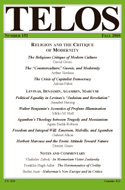From Telos 152 (Fall 2010), Gabriel Alkon’s “Freedom and Integral Will: The Abandonment of Sovereign Power in Emerson, Melville, and Agamben.” Read the full version at TELOS Online website.
 According to Giorgio Agamben, the Aristotelian conception of the act presupposes a sovereign decision on the passage to actuality. Only an utterly abandoned potentiality, says Agamben, would escape the logic of sovereignty. One of his figures for this pure-because-abandoned potentiality is Bartleby the Scrivener in Herman Melville’s story. Against Agamben this article argues that the notion of pure potentiality remains within the logic of sovereignty, which depends on the separation of actuality and potentiality. This separation establishes the sovereign will by placing it between potentiality and actuality and apart from both. By reducing it to preference and absolving it from action, Bartleby protects his sovereign will and reveals its essential emptiness.
According to Giorgio Agamben, the Aristotelian conception of the act presupposes a sovereign decision on the passage to actuality. Only an utterly abandoned potentiality, says Agamben, would escape the logic of sovereignty. One of his figures for this pure-because-abandoned potentiality is Bartleby the Scrivener in Herman Melville’s story. Against Agamben this article argues that the notion of pure potentiality remains within the logic of sovereignty, which depends on the separation of actuality and potentiality. This separation establishes the sovereign will by placing it between potentiality and actuality and apart from both. By reducing it to preference and absolving it from action, Bartleby protects his sovereign will and reveals its essential emptiness.
Melville is satirizing the very idea that there could be will and potentiality apart from actuality. The satire targets Ralph Waldo Emerson’s view of freedom as abandonment to the “total act” of pure power. Abandoned to unqualified and therefore invisible power, the self would act without actuality, and the will would be rescued from choice and determination. The story of Bartleby shows the impotence of one who waits, as Emerson recommends, for the overwhelming of the will by unqualified power. The satire reaches beyond Emerson to Agamben and other Heideggerean thinkers. The will that does nothing but preserve its options in an illusory fullness of potentiality is not free; in fact it does not exist. The only existent will is expressed in and conditioned by actual relations. Freedom is a measure of the will’s reception and integration of its activating solicitations. The integral will is not self-sufficient; it is extended by contingent ends in acts of love.








